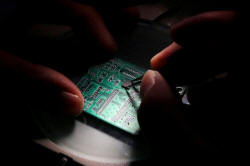China invites overseas investors to propel local chip
ambitions
 Send a link to a friend
Send a link to a friend
 [April 25, 2018]
By Cate Cadell [April 25, 2018]
By Cate Cadell
BEIJING (Reuters) - China is looking for
billions of dollars in funds to propel its domestic ambitions in chips
to cut a heavy reliance on imports, and has invited overseas investors
to help it get there.
The country's industry ministry said on Wednesday that it welcomed
foreign enterprises to invest in its top state-backed semiconductor
fund, even as tensions simmer over tech transfers between China and the
United States.
China is looking to accelerate plans to develop its semiconductor market
amid a fierce trade stand-off with the United States and a recent ban on
U.S. sales, including of American chips, to ZTE Corp.
China's National Integrated Circuit Investment Fund is now putting
together a second fund to support the sector, a Ministry of Industry and
Information Technology (MIIT) official said.
"We welcome foreign enterprises to participate," MIIT spokesman Chen Yin
said at a press conference in Beijing.
The fund, which raised about $22 billion previously, has been a target
for U.S. politicians concerned that Chinese firms, flush with state
money, could challenge U.S. chip giants like Qualcomm Corp for whom
China is a key market.

The United States Trade Representative referenced China's semiconductor
roadmap, which includes national funding, in a trade report that
authorized U.S. President Donald Trump to levy up to $100 billion in
tariffs against the country.
Jack Ma, the founder of tech giant Alibaba, said in Japan on Wednesday
that China needed to control its "core technology" like chips to avoid
over-reliance on U.S. imports.
Alibaba last week said it had bought Chinese microchip maker Hangzhou
C-SKY Microsystems, though Ma said the timing of the deal was not linked
to U.S.-China trade tensions.
[to top of second column] |

A researcher plants a semiconductor on an interface board which is
placed under a microscope during a research work to design and
develop a semiconductor product at Tsinghua Unigroup research centre
in Beijing, China February 29, 2016. REUTERS/Kim Kyung-Hoon/File
Photo

"We believe the internet of things is the future ... most things that have
electricity will have chips inside. So we need cheaper chips, effective chips,
inclusive chips that can be everywhere," Ma said during a live-streamed event at
Tokyo's Waseda University.
China's state-backed semiconductor fund, commonly referred to as the "Big Fund",
has previously backed major local projects including a $24 billion Tsinghua
Unigroup memory chip plant that is under construction in the Chinese city of
Wuhan.
Beijing says its supportive investment policies are designed to reduce China's
reliance on foreign semiconductors, which are one of the country's top imported
products by value.
That dependence was highlighted this month after the United States banned
American firms from selling components, including semiconductors, to ZTE.
Analysts say the ban could be potentially fatal for ZTE's smartphone business.
Chinese firms have also had a number of overseas deals to buy foreign chip
companies blocked by U.S. regulators in recent years, including a bid by
Tsinghua Unigroup to acquire U.S. chip group Micron Technology Inc.
($1 = 6.3219 Chinese yuan)
(Reporting by Cate Cadell; Editing by Adam Jourdan and Himani Sarkar)
[© 2018 Thomson Reuters. All rights
reserved.] Copyright 2018 Reuters. All rights reserved. This material may not be published,
broadcast, rewritten or redistributed.
Thompson Reuters is solely responsible for this content.
 |